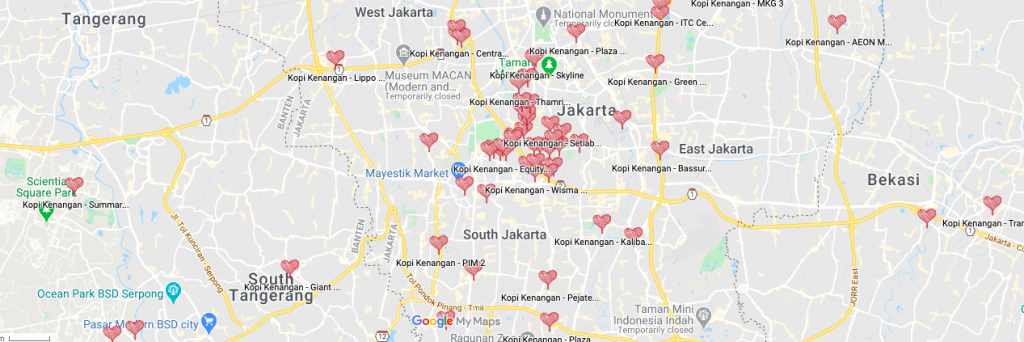Recap part 1 and part 2 of this series.
In April 2019, it was over a cup of coffee that an hour-long conversation involving Kopi Kenangan CEO Edward Tirtanata, COO James Pranato, and representatives from Sequoia India led to a USD 20 million investment two months later.
After the deal went through, Sequoia India investment advisor Rohit Agarwal wrote a post on his Linkedin page, explaining the firm believes that the most successful businesses have five key qualities—a match with everyday needs built around high-frequency use cases, the potential to expand outside one’s home market, differentiation, high gross margin, and a large user base.
With its offline operations and online presence, Kopi Kenangan checks all those boxes.
Now, while its competitors are bogged down by physical distancing and a slowed economy, Kopi Kenangan is entering its next stage of growth. The chain itself is not immune to the COVID-19 pandemic; its transactions dropped by 40% in the past two months, although orders at delivery-friendly locations have increased by 50%, Tirtanata said.
“People still need coffee even though they work or study from home. The difference is they don’t walk in or spend time in the outlets anymore. We are still opening new stores [amid the pandemic]. We want to prevent layoffs, and new stores mean more jobs. However, we are shifting our store expansion strategy. We won’t open in malls or office areas for now, and focus on residential areas instead,” said Tirtanata.
Read this: As Indonesians order their iced lattes online, coffee chains start selling them in bulk
The chain is expanding aggressively, more so than any other coffee retailer Indonesia has ever seen. It plans to open at least 180 new stores so that it will have 500 locations in Indonesia by the end of 2020.
If Kopi Kenangan manages to hit that target, it will be the biggest coffee retailer in Indonesia. Its closest competitor, Fore Coffee, which is backed by East Ventures, has just 117 outlets left after closing 16 stores in May. A local coffee franchise called Janji Jiwa claimed to have 700 stores in 2019, but only 10% of them are owned and managed by its founder and CEO, Billy Kurniawan.
Kopi Kenangan, on the other hand, does not grant franchise control to outsiders. Its founders maintain oversight of the brand to ensure that every branch meets the standards that are set by them. “I believe we are the only non-franchise local coffee chain at this scale. We don’t do franchise because you can’t maximize value for customers with this business model,” said Tirtanata.

This keeps costs for consumers under control too. “People have to pay around 7–10% of their income per month for a franchise license, so they need to mark up the price or use cheaper ingredients to cover the costs. That 10% can be used to buy better ingredients and equipment,” the CEO said.
Kopi Kenangan’s messaging may bring forth comparisons with a chain in China that has found itself in hot water recently. Luckin, a Chinese coffee retailer, made a splash by outnumbering Starbucks outlets in its home market within just three years. Its executives ostentatiously and repeatedly compared their company to America’s most well-known coffee chain, and even earned the “Starbucks killer” moniker. Recently, it has been in the headlines because of fudged accounting and the possibility of being delisted from the Nasdaq.
Last year, Starbucks China formed a dedicated retail and “digital innovations” team as a response to heightened competition in the country. It comes as no surprise to see Starbucks implement similar strategies in Indonesia.
Kopi Kenangan is growing far faster than Starbucks, which now has 440 stores after operating for 18 years in the country. Earlier this year, Starbucks Indonesia told local media that it plans to open another 60 outlets in 2020, matching Kopi Kenangan’s target.
The question remains whether Starbucks’ plans will keep pace with Kopi Kenangan’s digital integration, which has been in place since day one.
Tirtanata said Kopi Kenangan is incorporating a smart unmanned retail strategy. It is currently preparing cloud kitchens, unmanned coffee shops, and smart vending machines that will launch in phases throughout the year. “Once we have enough traffic on our app, we can drive customers not only to our brick and mortar stores, but also to unmanned coffee shops or vending machines. We currently have over one million customers on the app, and we want to triple the number this year.”
Those are high expectations, but the company might just pull it off. Kopi Kenangan is developing personalization features for its app to make it more convenient to place orders through phones. Think of it as a virtual version of the barista who knows your regular order.
After the COVID-19 pandemic passes, or at least when the curve is sufficiently flat, Kopi Kenangan wants to open new shops in Thailand, the Philippines, and Malaysia—all countries with their distinct coffee and tea cultures. “The Kopi Kenangan concept and the obsession of consumers would never change. In order to build an enduring brand like Starbucks or McDonald’s, we would like to keep a consistent concept across different countries with a slight localization in taste,” said Tirtanata.
The step after that would be to go public. Tirtanata has long had ambitions to bring an Indonesian F&B company to the trading floor.
With new frontiers on the horizon, Kopi Kenangan’s rapid rise has shown that there is a secret recipe that turns coffee grounds and social media buzz into a massive, regional success.

